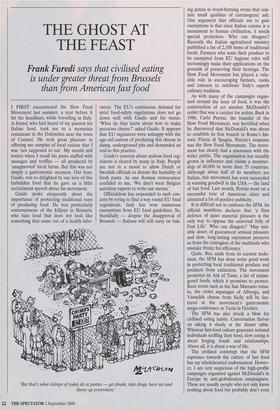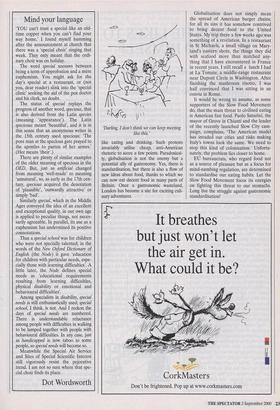THE GHOST AT THE FEAST
Frank Furedi says that civilised eating
is under greater threat from Brussels than from American fast food
I FIRST encountered the Slow Food Movement last summer, a year before it hit the headlines, while travelling in Italy. A friend, who had heard of my passion for Italian food, took me to a mountain restaurant in the Dolomites near the town of Canazei. He took great pleasure in offering me samples of local cuisine that I was 'not supposed to eat'. My mouth still waters when I recall his pasta stuffed with sausages and truffles — all produced by `unapproved' local farms. But this was not simply a gastronomic occasion. Our host, Guido, was so delighted by our love of this forbidden food that he gave us a little recruitment speech about his movement.
Guido spoke eloquently about the importance of protecting traditional ways of producing food. He was particularly contemptuous of the killjoys in Brussels, who hate food that does not look like something that came out of a health labo- ratory. The EU's continuous demand for strict food-safety regulations does not go down well with Guido and his mates. `What do they know about how to make pecorino cheese?' asked Guido. It appears that EU regulators were unhappy with the age-old custom of producing this cheese in damp, underground pits and demanded an end to this practice.
Guido's concern about zealous food reg- ulators is shared by many in Italy. People are not in a mood to allow Dutch or Swedish officials to dictate the humidity of fresh pasta. As one Roman restaurateur confided to me, 'We don't want Belgian nutrition experts to write our menus.'
Officialdom has responded to such con- cern by trying to find a way round EU food regulations. Italy has won numerous exemptions from EU food guidelines. So, thankfully — despite the disapproval of Brussels — Italians will still carry on bak- But that's what chimps of today do at parties — get drunk, take drugs, have sex and throw up everywhere.' ing pizzas in wood-burning ovens that con- tain small qualities of carcinogenic ash. One argument that officials use to gain exemptions is that since Italian cuisine is a monument to human civilisation, it needs special protection. Who can disagree? Recently the Italian agricultural ministry published a list of 2,100 items of traditional foods. Farmers who want their produce to be exempted from EU hygiene rules will increasingly make their applications on the grounds of preserving their heritage. The Slow Food Movement has played a valu- able role in encouraging farmers, cooks and caterers to celebrate Italy's superb culinary tradition.
As with many of the campaigns organ- ised around the issue of food, it was the construction of yet another McDonald's outlet that was a catalyst for action. Back in 1986, Carlo Petrini, the founder of the Slow Food Movement, was horrified when he discovered that McDonald's was about to establish its first branch in Rome's his- toric Piazza di Spagna. Petrini's response was the Slow Food Movement. The move- ment has clearly had a resonance with the wider public. The organisation has steadily grown in influence and claims a member- ship of 60,000 in more than 35 countries. Although about half of its members are Italian, this movement has even succeeded in winning goodwill in the USA — the land of fast food. Last month, Petrini went on a successful tour of American cities and attracted a lot of positive publicity.
It is difficult not to embrace the SFM. Its official manifesto declares that 'a firm defence of quiet material pleasure is the only way to oppose the universal folly of Fast Life'. Who can disagree? 'May suit- able doses of guaranteed sensual pleasure and slow, long-lasting enjoyment preserve us from the contagion of the multitude who mistake frenzy for efficiency.'
Quite. But, aside from its earnest hedo- nism, the SFM has done some good work in protecting local traditional produce and products from extinction. The movement promotes its Ark of Taste, a list of endan- gered foods, which it promises to protect. Rare treats such as the San Marzano toma- to, the violet asparagus of Albenga, and Vastedda cheese from Sicily will be fea- tured at the movement's gastronomic mega-conference in Turin in October.
The SFM has also struck a blow for civilised eating habits. Conversation thrives on taking it slowly at the dinner table. Whereas fast-food culture generates isolated individuals scoffing their food, slow eating is about forging bonds and relationships. Above all, it is about a way of life.
The civilised contempt that the SFM expresses towards the culture of fast food has my wholehearted endorsement. Howev- er, I am very suspicious of the high-profile campaigns organised against McDonald's in Europe by anti-globalisation campaigners. These are usually people who not only know nothing about food but probably don't even `Darling, I don't think we can keep meeting like this.'
like eating and drinking. Such protests invariably utilise cheap, anti-American rhetoric to score a few points. Paradoxical- ly, globalisation is not the enemy but a potential ally of gastronomy. Yes, there is standardisation, but there is also a flow of new ideas about food, thanks to which we can now eat decent food in many parts of Britain. Once a gastronomic wasteland, London has become a site for exciting culi- nary adventures. Globalisation does not simply mean the spread of American burger chains; for all its sins it has somehow contrived to bring decent food to the United States. My trip there a few weeks ago was something of a revelation. In a restaurant in St Michaels, a small village on Mary- land's eastern shore, the things they did with seafood more than matched any- thing that I have encountered in France in recent years. I still recall a lunch I had at La Tomate, a middle-range restaurant near Dupont Circle in Washington. After finishing the mushroom risotto, I was half convinced that I was sitting in an osteria in Rome.
It would be wrong to assume, as some supporters of the Slow Food Movement do, that the main threat to civilised eating is American fast food. Paolo Saturini, the mayor of Greve in Chianti and the leader of the recently launched Slow City cam- paign, complains, 'The American model has invaded our cities and risks making Italy's towns look the same. We need to stop this kind of colonisation.' Unfortu- nately, the problem lies closer to home.
EU bureaucrats, who regard food not as a source of pleasure but as a focus for mind-numbing regulation, are determined to standardise our eating habits. Let the Slow Food Movement focus its energies on fighting this threat to our stomachs. Long live the struggle against gastronomic standardisation!



























































 Previous page
Previous page